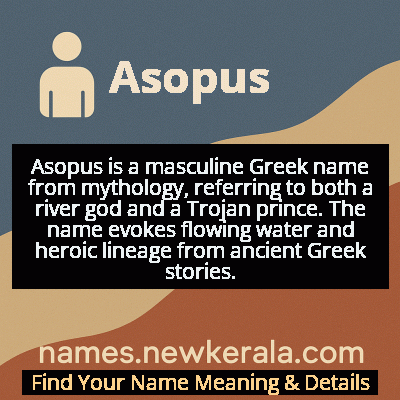Asopus Name Meaning & Details
Origin, Popularity, Numerology Analysis & Name Meaning of Asopus
Discover the origin, meaning, and cultural significance of the name ASOPUS. Delve into its historical roots and explore the lasting impact it has had on communities and traditions.
Name
Asopus
Gender
Male
Origin
Greek
Lucky Number
1
Meaning of the Name - Asopus
Asopus is a masculine Greek name from mythology, referring to both a river god and a Trojan prince. The name evokes flowing water and heroic lineage from ancient Greek stories.
Asopus - Complete Numerology Analysis
Your Numerology Number
Based on Pythagorean Numerology System
Ruling Planet
Sun
Positive Nature
Leaders, ambitious, highly driven, self-reliant, innovative.
Negative Traits
Overly aggressive, domineering, impatient, selfish.
Lucky Colours
Red, orange, gold.
Lucky Days
Sunday.
Lucky Stones
Ruby, garnet.
Harmony Numbers
2, 3, 9.
Best Suited Professions
Entrepreneurs, managers, engineers.
What People Like About You
Courage, determination, leadership.
Famous People Named Asopus
Asopus (Mythological)
River God
Divine personification of the Asopus River in Boeotia, father of numerous nymphs and heroes
Asopus of Troy
Trojan Warrior
Son of Hector who fought bravely in defense of Troy before being killed in battle
Asopus (Historical Figure)
Ancient Greek Noble
Mentioned in various ancient texts as a prominent figure in Boeotian politics and culture
Name Variations & International Equivalents
Click on blue names to explore their detailed meanings. Gray names with will be available soon.
Cultural & Historical Significance
The name also appears in Homeric tradition as one of Hector's sons, linking it to Trojan royalty and the epic narratives of the Iliad. This dual significance—both as a natural force and a heroic figure—gives the name deep roots in classical literature and mythology. The river itself played a crucial role in the development of ancient Greek civilization, providing water for agriculture and settlements throughout Boeotia. The mythological narratives surrounding Asopus often explore themes of divine intervention, territorial disputes among gods, and the relationship between natural features and human communities.
Extended Personality Analysis
Individuals named Asopus are often perceived as having strong, flowing personalities with deep emotional currents. They tend to be protective and nurturing, much like the life-giving rivers their name evokes, showing great care for family and community. Their character often combines resilience with adaptability—able to navigate obstacles while maintaining their core direction and purpose. There's typically a strong sense of heritage and tradition associated with Asopus, leading to individuals who value history and cultural continuity.
They may exhibit both the gentle persistence of flowing water and the powerful force of a river in flood, capable of great emotional depth and occasional intensity. This combination makes them both reliable and dynamic, with an innate understanding of natural rhythms and human connections. People with this name often demonstrate patience and persistence in pursuing their goals, much like a river carving its path through landscape over centuries. They tend to be deeply connected to their roots while also being forward-moving, embodying the paradox of being both ancient and ever-renewing. Their strength lies in their ability to be both constant and changing, traditional yet adaptable.
Modern Usage & Popularity
In contemporary times, Asopus remains an exceptionally rare name, primarily used by families with strong connections to Greek heritage or classical studies. It sees occasional use among academic families, particularly those specializing in classics or ancient history. The name maintains a niche appeal for parents seeking unique mythological names with deep historical roots. While not appearing on mainstream baby name charts, it occasionally surfaces in Greek diaspora communities and among enthusiasts of ancient literature. Its usage has seen a slight increase in recent years alongside the growing popularity of mythological names, though it remains far from common. The name's rarity gives it an air of exclusivity and intellectual sophistication, often chosen by parents who want a name that reflects classical education and cultural appreciation rather than current naming trends.
Symbolic & Spiritual Meanings
Symbolically, Asopus represents the flowing, life-sustaining qualities of water—embodying concepts of nourishment, continuity, and natural power. The name evokes the eternal movement of rivers, symbolizing both constancy and change, as water constantly flows yet the river remains. It carries connotations of fertility and abundance, reflecting the river's role in supporting agriculture and civilization. Asopus also symbolizes the connection between humanity and nature, between heroic lineage and geographical features. The dual nature of the name—both divine river and mortal hero—represents the intersection of the supernatural and human realms. It suggests depth, hidden currents, and the enduring power of natural forces that shape both landscapes and human destinies, while also embodying the tragic heroism of the Trojan prince who shared this storied name.

